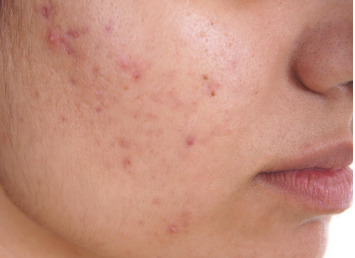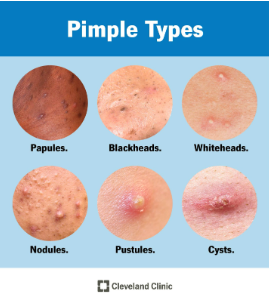By: Geraldus Sigap
Acne, or breakouts, can be one of the most frustrating skin issues that many people face. From occasional pimples to more persistent, chronic acne, skin blemishes can affect your confidence and overall well-being. Fortunately, understanding what causes acne and knowing how to properly care for your skin can make a significant difference in achieving clearer, healthier skin. In this guide, we will explore the causes of acne, tips for prevention, and effective treatments that can help you on the path to clearer skin.

Figure 1. Acne on the skin
Acne is a common skin condition that affects millions of people worldwide, regardless of age or gender. It occurs when the pores of the skin become clogged with oil, dead skin cells, and bacteria. There are several factors that contribute to breakouts:
- Excess Oil Production: The skin naturally produces oil, called sebum, which helps keep it moisturized. However, when too much oil is produced, it can mix with dead skin cells and block the pores, leading to acne.
- Bacteria: Bacteria known as Propionibacterium acnes can thrive in the clogged pores, leading to inflammation and the formation of pimples or cysts.
- Hormonal Changes: Hormonal fluctuations, particularly during puberty, menstruation, pregnancy, or stress, can trigger the sebaceous glands to produce more oil, increasing the likelihood of breakouts.
- Diet and Lifestyle: While the link between diet and acne is still being studied, some research suggests that certain foods, such as those high in sugar or dairy, may contribute to breakouts. Additionally, stress, lack of sleep, and improper skincare routines can exacerbate acne.
- Genetics: Some individuals are more prone to acne due to their genetic makeup. If acne runs in your family, you may be more likely to experience frequent breakouts.
Not all acne is the same. Different types of breakouts require different approaches to treatment.
Understanding what type of acne you are dealing with can help you target it more effectively:
- Whiteheads: These are small bumps that form when a pore becomes clogged but remains closed at the surface. They are usually flesh-colored or white.
- Blackheads: Blackheads form when a pore is clogged but remains open. The buildup of oil and dead skin cells oxidizes, turning the tip of the bump black.
- Papules: Papules are small, red bumps caused by inflammation in the skin. They do not contain pus and can be tender to the touch.
- Pustules: Pustules are similar to papules but contain pus, making them appear white or yellow at the center.
- Cysts and Nodules: These are larger, more painful bumps that form deep within the skin. They are often filled with pus and can lead to scarring if not treated properly.

Figure 2. Types of acne
- Cleanse Gently: Washing your face twice a day with a gentle cleanser helps remove excess oil, dirt, and makeup that can clog pores. Avoid harsh scrubbing, as this can irritate the skin and make acne worse.
- Moisturize: Many people with acne-prone skin shy away from moisturizers, fearing that they will make their skin more oily. However, using a lightweight, non-comedogenic moisturizer can help balance your skin’s hydration without clogging pores.
- Avoid Touching Your Face: Touching your face can transfer oils and bacteria from your hands to your skin, increasing the risk of breakouts. Try to avoid resting your face on your hands or picking at pimples, as this can lead to infection or scarring.
- Watch Your Diet: Although research is ongoing, some studies suggest that certain foods, such as those high in refined sugars, may contribute to breakouts. Maintaining a balanced diet rich in fruits, vegetables, and whole grains can benefit your skin’s overall health.
- Choose Non-Comedogenic Products: When selecting skincare or makeup products, look for those labeled as non-comedogenic. These products are formulated not to clog pores, which can help reduce the risk of breakouts.
- Manage Stress: Stress can cause the body to produce more hormones, leading to increased oil production and breakouts. Incorporating stress-reducing activities such as exercise, meditation, or yoga can help keep your skin clearer.
If over-the-counter products and home remedies are not enough to control your acne, there are several professional treatments available that can significantly improve your skin’s appearance.
Depending on the severity of your acne, a dermatologist may recommend the following options:
- Topical Treatments: Prescription-strength topical treatments containing ingredients such as retinoids, benzoyl peroxide, or salicylic acid can help reduce acne by exfoliating the skin, unclogging pores, and killing acne-causing bacteria.
- Oral Medications: For moderate to severe acne, oral medications such as antibiotics, hormonal treatments, or isotretinoin (commonly known as Accutane) may be prescribed. These medications work by reducing inflammation, controlling oil production, or targeting hormonal imbalances.
- Chemical Peels: A chemical peel involves applying a solution to the skin that causes the outer layer to peel off, revealing smoother, clearer skin underneath. Chemical peels can be effective in treating mild to moderate acne, as well as reducing the appearance of acne scars.
- Laser and Light Therapy: Laser and light-based treatments target the bacteria that cause acne and help reduce inflammation. These treatments can be effective for those who have not responded to other therapies.
- Extraction Procedures: In some cases, a dermatologist may perform extraction procedures to manually remove blackheads or whiteheads that have not responded to other treatments. This is often done in conjunction with other therapies to enhance results.
If your acne is persistent or if it is affecting your self-esteem, it may be time to seek professional help. Dermatologists are skin care experts who can provide a tailored treatment plan based on your specific needs. They can diagnose the type of acne you are experiencing and recommend the best treatment options for your skin type and condition.
Seeking early treatment is important, especially for more severe forms of acne such as cystic acne, which can lead to permanent scarring if left untreated. With the help of a dermatologist, you can not only improve your skin but also prevent long-term damage.
In addition to acne treatments, our dermatovenerologists also provide a full range of skin care services, including anti-aging treatments, mole evaluations, and skin cancer screenings. Our comprehensive approach ensures that your skin receives the best care possible, no matter your age or skin type.
Battling breakouts can be challenging, but with the right knowledge and professional care, achieving clearer skin is possible. By understanding the causes of acne, taking preventive steps, and exploring effective treatments, you can improve your skin’s health and appearance. If you are struggling with acne or other skin concerns, do not hesitate to seek the expertise of a dermatovenerologist.
At RS Abdi Waluyo, our team of dermatology specialists is ready to help you on your journey to clearer, healthier skin. Schedule a consultation today and discover the personalized care that makes RS Abdi Waluyo a trusted name in skincare. With the right treatment plan, you can feel more confident in your skin and enjoy a blemish-free future
Resources
- Acne: Causes, treatment, and tips [Homepage on the Internet]. 2017 [cited 2024 Oct 9];Available from: https://www.medicalnewstoday.com/articles/107146
- Pimples: Causes vs. Acne, Types & Treatment [Homepage on the Internet]. Clevel. Clin. [cited 2024 Oct 9];Available from: https://my.clevelandclinic.org/health/diseases/22468-pimples
- Acne: Tips for managing [Homepage on the Internet]. [cited 2024 Oct 9];Available from: https://www.aad.org/public/diseases/acne/skin-care/tips
